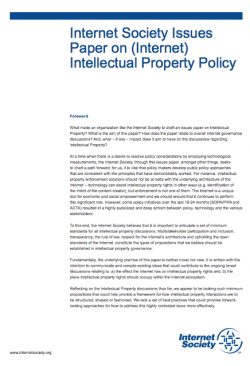Author: Konstantinos Komaitis, Director, Policy Development
Over the past years, the idea of how to reconcile intellectual property rights and the Internet technologies and platforms has become a pivotal point of all Internet governance discussions. With the emergence of the Internet as a means of communication, creativity, innovation and ideas and with the increasing accessibility to information, traditional concepts of intellectual property appear increasingly antiquated and inapplicable in a space where information is democratized, people become increasingly more empowered to create, exchange and distribute content and innovation and creativity proliferate.
For the Internet Society, policy and technology discussions regarding the relationship between the Internet and intellectual property should continue to address the multiple challenges imposed by the nature and architecture of the Internet. At the same time, we feel that the time is right for the Internet community to reflect and strategize on how to create a harmonious nexus between Internet platforms and intellectual property regimes. In this respect, we believe that a good starting point is the setting of some minimum standards of process and substance that could facilitate and guide such discussions.
An important point for the Internet Society in submitting this issues paper is the understanding that intellectual property discussions, irrespective of whether they reflect trademark, copyright or patent considerations and, as long as they primarily relate to Internet concerns or propositions, are part of the wider Internet governance discussions. This pragmatic rationalization is significant in making some subsequent determinations relating to the structure, design and ultimate approach of such discussions.
